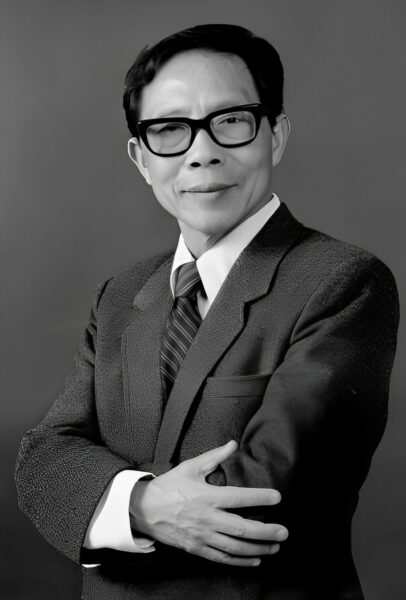
Liu Kwang-Ching. Photo courtesy University of California, Davis, History Department
Liu Kwang-Ching, professor emeritus at the University of California, Davis, died in his Davis home on the morning of September 28, 2006.
Born in Beijing, Liu came from a distinguished family; his maternal grandfather, Chen Baozhen, served as an imperial tutor. He was raised in Fuzhou, where he attended a Methodist missionary school and learned English from an American tutor. For his secondary education, he was sent to the Diocesan Boys’ School in Hong Kong, and after the Japanese invasion, he went to the National Southwest Associated University in Kunming. After completing his junior year there, he received a scholarship to finish his undergraduate work in the United States. He entered Harvard University in 1943, graduated magna cum laude and Phi Beta Kappa in 1945, and continued in the history doctoral program. Liu published his first article in the 1946 Journal of Modern History on “German Fear of a Quadruple Alliance, 1904–1905.” Then, heeding his adviser, he switched his focus to Chinese history, under the direction of his mentor and later colleague, John K. Fairbank, and earned his doctorate in 1956. After a six-year stint as a Chinese translator for the United Nations Secretariat, he returned to Harvard as research fellow and instructor, and then went to Yale University in 1962 as a visiting associate professor. In 1963, he took a position in the history department at the University of California, Davis, where he taught until his retirement in 1993.
Best known for his work on 19th-century Chinese social and political history, he pioneered the study of foreign business interests in China under the regime of asymmetrical treaty rights. His first monograph, Anglo-American Steamship Rivalry in China, 1862–1874 (Harvard Univ. Press, 1962), was followed by a voluminous output of scholarship on a widening range of topics. His interests branched out to include Sino-American relations, the history of Christian missions, power relations within the late dynastic governmental order, the intellectual and political dimensions of statecraft and modernization, and the historiography of peasant rebellions. The importance of ideology in government, rebellion, and modernization figured prominently in his research and inspired him to organize a large international conference on the subject in 1981, funded by the American Council of Learned Societies. Liu edited the two volumes that emerged from that conference, Orthodoxy in Late Imperial China (Univ. of California Press, 1990)and Heterodoxy in Late Imperial China (Univ. of Hawaiʻi Press, 2004), the second with Richard Shek. He contributed three chapters to the authoritative Cambridge History of China and with Fairbank co-edited volume 11. Fairbank once wrote that he considered Liu to be “the foremost historian of 19th-century China.” In addition to his own research, Liu contributed prolifically to the bibliographical literature, editing and co-editing volumes and studies on US-China relations, imperial archives, and both Chinese and American scholarship on modern China. His efforts in 1972–73 as negotiator and intermediary resulted in financial support from the American Council of Learned Societies for the photographing and publication of voluminous historical archives in the National Palace Museum, Taiwan.
In 1976, he was elected to membership in the Academia Sinica, Taiwan, and was chairman of the advisory committee of its Institute of Modern History. Liu served on the AHA’s Research Division from 1983–86 and was a member of the Joint Committee on Sino-American Cooperation in the American Council of Learned Societies and the Social Science Research Council. He was associate editor of the Journal of Asian Studies and member of the editorial board of the Tsinghua Journal of Chinese Studies and of the editorial committee of the University of California Press.
K. C., as he was known to faculty colleagues and students alike, was a dedicated teacher, often prolonging evening graduate seminars with a collective visit to a local pub. He took a fatherly interest in his graduates, and with his eminent reputation, he helped them find academic jobs around the country and connect with academic presses to publish their dissertations as books. Extremely hospitable, he often hosted dinners for his graduate students at his home. In his undergraduate teaching, he gave some really noteworthy lectures, and his courses inspired some students to pursue graduate study with him. If he had any hobby, it was calligraphy, in which he rarely indulged, then only when prompted by Chinese visitors.
He was survived by his wife, Edith, his wife of five decades, since deceased, and by his son, Jonathan, and daughter, Faith.
Don C. Price
University of California, Davis (emeritus)
This work is licensed under a Creative Commons Attribution-NonCommercial-NoDerivatives 4.0 International License. Attribution must provide author name, article title, Perspectives on History, date of publication, and a link to this page. This license applies only to the article, not to text or images used here by permission.